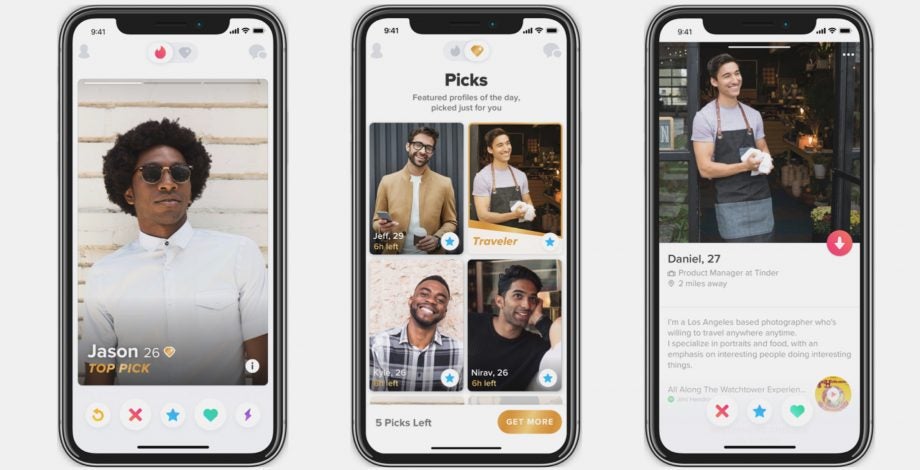Is online dating safe? We asked three security experts

Valentine’s Day is around the corner and, with lockdown still going, you may have found yourself relying on dating apps now more than ever. Unfortunately, you never quite know who you’re talking to on Tinder. We spoke to three leading security experts to learn the best ways to stay safe on the online dating scene.
This year, McAfee celebrated February 14th by sharing some pretty worrying stats regarding our online dating habits.
According to the security firm, nearly a third of Brits aged 16-35 have had their online dating account hacked, with over a quarter of those users extorted for money and 23% having found their identities stolen.
With these risks in mind, we asked security experts from McAfee, F-Secure and Kaspersky for their advise on how to stay safe when using online dating apps.
Here’s what they said.
What are the biggest dangers of using online dating apps?
Principal Security Consultant at F-Secure, Tom Gaffney. was quick to point out that online daters can often fall victim to scams and fraudulent activity.
“Dating scams are some of the most common sorts of spam preying on the pursuits of romance”, explained Gaffney. “The key to avoiding such scams is awareness – you need to know what you are looking for. Read up on what the most common scams are that are prevalent at the time and keep in mind that scammers are people pleasers; more often than not if it’s too good to be true, it probably is and it’s best to stay well clear”.
Fortunately, it isn’t all doom and gloom on Tinder, Hinge and Bumble.
“Dating apps can be a safe and enjoyable way to meet new people, especially at the moment during lockdown, as long as you take the right precautions and know how to protect your personal details”, reassured Chief Scientist and McAfee Fellow Raj Samani.
So, which apps and websites should you use?
“The safest thing to do is actually to pick a reputable dating website, one that you and your friends and other people have heard of, one that’s got a track record that you’re aware of”, said Principal Security Researcher at Kaspersky, David Emm.
The safest apps and websites are the ones recommended by friends, not the one’s you find on Google.
“If you weren’t a wine drinker, for example, and you were interested in drinking some wine for the first time, maybe you would ask somebody else what their experience was”, explained Emm. “You’d say to a friend, “Look have you got any experience with this? What kind of wines are good for a first timer?”, and equally we could do the same with this”.
How much personal information is it safe to share in your online dating profile?
“This is really tricky, especially with something like online dating, because on the one hand you don’t want to create a completely fake persona because if you do obviously you then don’t look trustworthy”, said Emm. “There are certain things you’ve got to be straight about, I think. But, on the other hand, not necessarily with everything”.
“While a lot of people associate online crime with malware or phishing attacks, many aren’t aware of how vulnerable they are when sharing information on social media, on your dating profile, or elsewhere online”, explained Samani. “If you are not careful, potential love interests, and fraudsters alike, can find information about your life – all leaving you vulnerable. This includes sharing personal details about yourself on social media, such as age, location and occupation, as well as sharing photos which may give away these details – such as photos of your home. And, with many daters logging into dating apps via their social media account, the information on your social profiles could be visible on your dating profile too”.
Make sure to double check your privacy setting across your social media accounts as well as your dating apps to make sure sensitive information, such as your home address or your workplace, is made public.
How can you prevent someone from finding personal information through other websites?
“Every day, people leave streams of information about themselves online without considering the risks of their digital footprint”, warned Samani. “Personal information is usually prominent on social media platforms given their nature, however, any online account you have may contain personal information”.
So, how can you prevent potential dates from tracking your digital footprint?
“It is recommended to not recycle photos that are used on different apps like social media or LinkedIn”, said Gaffney. “A simple reverse image search can bring up any relevant accounts, some of which may hold additional information you didn’t want to disclose on your dating profile. The same goes for using a shared email address – consider making a new one specifically for your dating profiles”.
Another step you can take is to put yourself in your date’s shoes by running a simple search on yourself.
“Google yourself”, advised Emm. “Imagine that you were trying to find information on you and see what you can find, and if there’s information out there that is maybe surprising to you and you didn’t realise was out in the public domain, then maybe you can take steps to conceal it”.
What should you do if someone does gain access to your account?
So, you’ve been hacked. What steps can you take to re-secure your account?
“If somebody hasn’t locked you out of your own account, I would say the first thing to do is to go in and change your password and set up two-factor authentication”, recommended Emm. “If you aren’t able to get into your account and you’ve been locked out of it, then that’s the point really to contact the service provider and explain to them what’s happened and see what help they can give you in terms of freezing that account while they look into it”.
However, you should also be aware of the consequences the breach might have had already.
“As best practice, you should never reuse passwords”, warned Samani. “If someone guesses a password for one account, they can potentially use it to get into other accounts. You should also act quickly and delete your account, as well reporting the hack to the app.
“If you suspect someone is trying to steal your identity, contact your local or national law enforcement agency to file a report that your identity has been stolen. You should also call your bank and credit card companies to notify them of fraudulent activity. They may be able to reimburse you for any money lost or close any unauthorized accounts”.
And, finally, how can you avoid being catfished?
“Getting “catfished” means you’ve been duped into believing someone you’ve met on the Internet is a real person – even though they are completely fabricated by someone else”, said Samani. “Some dating apps have a feature called ‘Photo Verification’ which aims to protect you from fake users. This means that the app has confirmed the person in the profile photo to be a genuine user and will display a blue checkmark to confirm this, similar to platforms such as Twitter or Instagram. This helps daters in knowing whether the person they are talking to are real”.
“Ask yourself the question: If I knew this person or the person that this person is claiming to be, would I be asking them X, Y and Z question at this point let’s say in our relationship?” said Emm. “If the answer is no, if you wouldn’t be grilling them on that kind of information, then maybe wonder why they are”.
Examples of these questions include asking for money, requests to meets up soon after matching or refusing to reveal their face full-stop. Unfortunately, with meetups on hold due to the lockdown, these situations can be trickier than ever to navigate.
Another option is to do a reverse image search on your match’s profile image to see whether it matches up with any other online profiles.
“It’s finding the digital equivalent to the things we do in real life where we get the vibes about people because of face to face contact that we don’t get automatically in a digital interaction”.
If you’re looking to boost your privacy online, make sure to check out our guides to the best antivirus software, as well as to the best VPNs.


